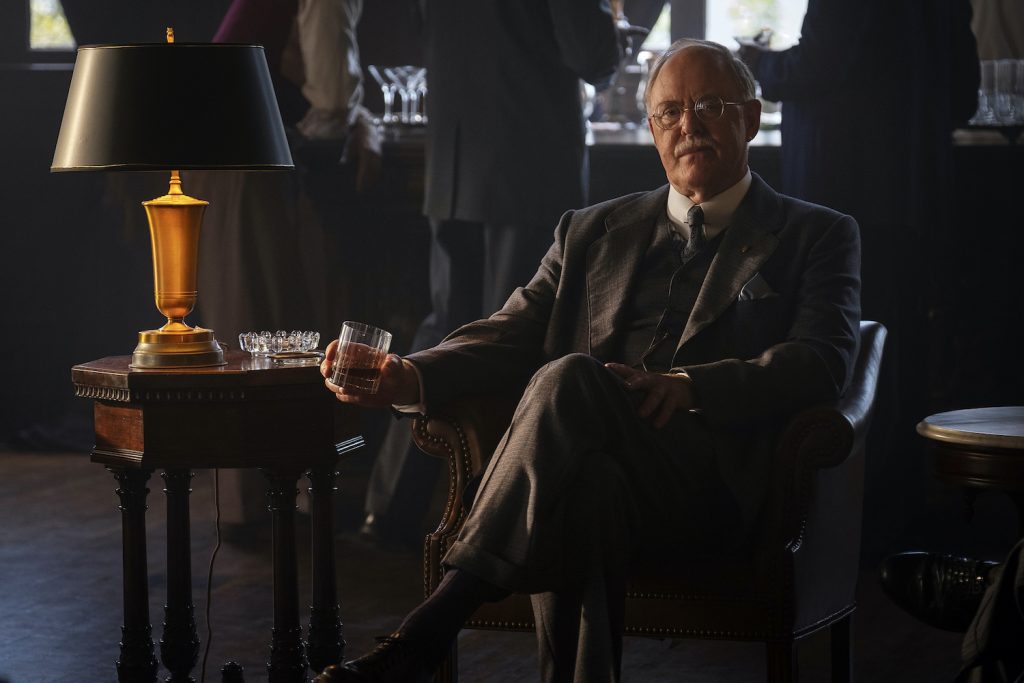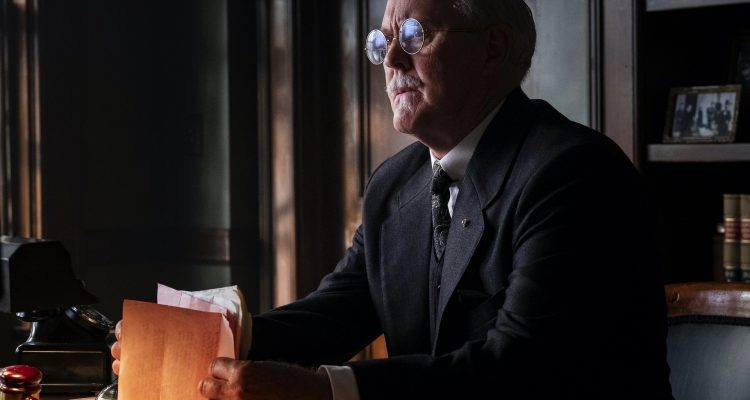In season one of HBO’s Perry Mason, John Lithgow is magnetic as E.B. Jonathan, the lawyer and mentor to Perry Mason (Matthew Rhys). The six-time Emmy winner morphs into the role to great critical acclaim, showcasing a fragility in the declining attorney as we learn the “unsettling” details of his life.
Lithgow loved the script and found the approach radical compared to the Perry Mason of the Raymond Burr-led series. “This turned all those expectations on their head,” Lithgow shares. “For one, Perry Mason isn’t a lawyer in our series, he’s a down on his luck private investigator working for my character who is the lawyer.”
He credits writers Ron Fitzgerald and Rolin Jones for season one’s vision. The duo combed through the history of Los Angeles in the 1930s and wove certain details into the fabric of their Perry Mason as witnessed in the trailer:
Lithgow has also been incredibly active outside his television and film work, writing a series of New York Times bestsellers in Shakespearean verse, including Dumpty: The Age of Trump in Verse and Trumpty Dumpty Wanted a Crown: Verses for a Despotic Age. His latest book, A Confederacy of Dumptys: Portraits of American Scoundrels in Verse, continues satirizing the Trump administration and delves back into the 19th and 20th centuries to find Trump’s precursors.
Awards Focus spoke with Lithgow about developing his character for Perry Mason, reflecting on his youth in Shakespeare, and how appearing on 3rd Rock From The Sun added ten years onto his life.
Awards Focus: Your father produced Shakespeare performances and festivals that you were involved with from a very early age. Can you talk about that experience and how those stories influenced you?
John Lithgow: I grew up in eight places, but four of those were in Ohio and my father put on Shakespeare festivals. As a kid, I was very involved. I would hang around watching rehearsals, befriending the grown-up actors and playing kid parts like fairies in A Midsummer Night’s Dream.
By the time I was a teenager, I was working as an apprentice in my dad’s festivals and would play lots of the little character parts. I always said that it was that unique background, certainly unique for an American actor, that primed me to play very different parts with every project I did.
If you were in a repertory Shakespeare company, you’re playing a very different part of a very different play every single night of the week. When you think about it, and I never did think about it, that’s what I’ve done my whole career. That’s how I ended up going from Third Rock From The Sun to Dexter, to Churchill in The Crown, and Perry Mason on television.
AF: That’s very true, and each one of those previously mentioned roles represents an Emmy win for you.
Lithgow: (laughing) Oh, that’s not why I did that. I promise.
AF: Working with these great writers, Rolin Jones and Ron Fitzgerald, I’m curious about your process crafting the character, from his poise, to his rhythm, even the great mustache. Were those choices things you spoke about with the writers?
Lithgow: It really was an ingenious creation, the character of E.B. Jonathan. They were re-imagining the roles of Perry Mason, and Della Street, and Paul Drake, all these characters from the 50s and 60s TV series.
As inventive as all those re-imagined characters are, E.B. Jonathan is a complete original because they saw that they needed some sort of engine for the entire plot. They created an origin story and needed a sort of mentor that helped define Perry, and also as someone who Perry had to grow up and replace in an Oedipal way.
When my agent called me and said, ‘They want you for a role that only lasts the first four episodes of an eight-episode series,” I was immediately very curious. What in the world happened to him?
Well, what happened to him is the son slays the father, basically just like a certain Greek drama. Reading the scripts and finding out exactly why I exit the series after four episodes, I was so impressed by the ingenuity of the writers.
That made it easy to make all those character choices. E.B. Jonathan is a man who makes a big attempt to dress great because inside he’s falling apart. I grew my own mustache because I thought it would be kind of cool, especially looking at figures like Eugene O’Neill from that era.
Everything came easy on this job and it all starts with the writing. I’ve always said the only hard acting is bad writing. With great writing, it’s effortless and really fun.
AF: When we talk about great writing, it’s an actor’s interpretation of the words and that intangible chemistry between co-stars. Was there a scene you got to do in Perry Mason that you came in with one inclination and then, as you all worked through it, discovered something that took it in a whole new direction?
Lithgow: We really didn’t get the chance to rehearse, and I wasn’t even in town for the first table read prior to shooting. Some other actor came in and apparently did a much better job that I was capable of doing.
There’s a scene where E.B. wakes up fully dressed. His feet hurt because he never took his shoes off when he went to sleep. When Perry Mason finds him in such disarray, E.B. reminisces about when he first saw Perry as a young kid. There’s a moment where he asks Perry to take his shoes off, and while he’s sitting there in the chair, he reminisces about seeing Perry sitting on a seat of a wagon with his father. In the middle of a take, it wasn’t planned or rehearsed, I just ruffled Matthew’s (Rhys) hair as he took my shoes off.
It’s something that happened between Matthew and me, not part of the rehearsal. It told the whole story, and that’s the kind of thing that’s gravy. The man’s frailty, and his deep affection for Perry. It’s something that happens because of everything that preceded it. I just loved that scene. I loved it while I was doing it. The day we wrapped that scene, I thought “Oh, boy, this is going to be special.”

AF: Was the process of working with Tim Van Patten on Perry Mason unique to your other experiences on television? Can you talk about what he brought to the table?
Lithgow: He’s just the most wonderful person to work for because everything is effortless. He would rather be on a set shooting than do anything else.
He cast the most amazing ensemble of actors, and not an asshole among them. I worked with so many great people where it was just one great actor after another. The boys, Rolin [Jones] and Ron [Fitzgerald], they’ve written such great ensemble scenes that were right out of Hecht and MacArthur: 1930s Tommy gun dialogue.
It was that wonderful thing where the whole concept of the series was to re-imagine a corny, old 1950s lawyer series as a 1930s noir crime drama, set in Los Angeles with a lot of wit, snap, and humor to it. These guys knew exactly how to play these scenes.
Sometimes there would be a very expository scene but it’s so pulsing with life and character that you don’t even know you are watching the engines of the plot turn.
AF: Last May marked twenty years since the 3rd Rock From The Sun finale. Three Emmy wins, and an incredible cast, is a testament to the talent that everybody brought to the show. Is there a particular memory you have working on set that brings a smile to your face when you look back on that time?
Lithgow: There are like a thousand moments. That was the most gloriously fun job. I’m convinced that I’ll have an extra ten years of my life because of all the laughter.
I just got back from New York, my first time in a year and a half, and I had supper with Bonnie and Terry Turner, the creators of the series who remain among my very best friends. They had created the series with me in mind, and said wouldn’t have done it if I hadn’t said yes.
Every episode was a different challenge and called upon different chops. There again, it was a whole bunch of actors who knew exactly how to do the material. Just as everyone on Perry Mason understood the genre we were working in, everyone on 3rd Rock understood the comedy of the series, which was extremely unusual like Faulty Towers, theatrical and far out. Everybody could do it.
AF: What do you have coming up next?
Lithgow: I have a whole ton of stuff coming down the pipe. It’s almost like the drain was clogged and now it’s a gusher. I’m certainly not worried about being idle. During Covid, I wrote not one but two books of satirical verse. This is something very recent because it satirizes the Trump administration.
It’s a trilogy. The first is called Dumpty: The Age of Trump in Verse. The second is called Trumpty Dumpty Wanted a Crown: Verses for a Despotic Age. The one I just finished, I’m actually finishing illustrations this morning, is called A Confederacy of Dumptys: Portraits of American Scoundrels in Verse, which goes back in history back to the 19th century and earliest 20th century to find all of Trump’s precursors. It’s been a fantastic and creative year but has had nothing to do with acting.
Have a look at the first two books. They’re sensational, if I do say so myself.


